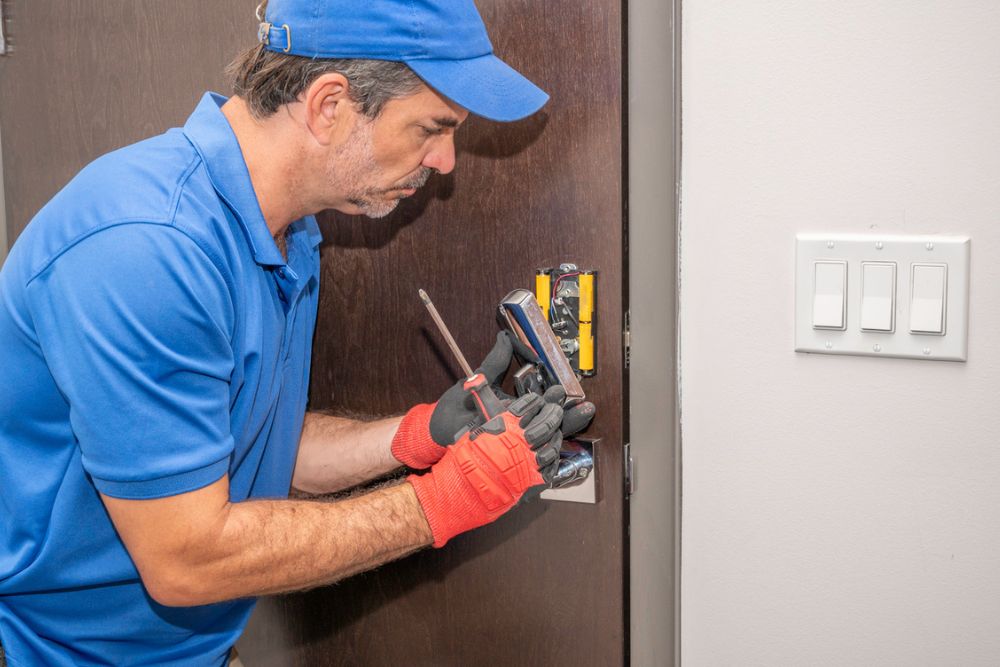Workers' Compensation Insurance for Locksmiths: A Complete Guide

Workers' compensation insurance for locksmiths covers your employees in case of injury, whether they’re working in a shop or out in the field. Whether it’s shop work or on-site services, using the right code helps you avoid overpaying for premiums while making sure your workers are properly protected.
What are Class Codes and why do they matter?
Class codes are four-digit numbers that help insurance companies categorize job roles based on their risk levels. The National Council on Compensation Insurance (NCCI) assigns these risk rates by examining how often injuries occur in each job. This helps insurance companies set appropriate workers' comp rates for locksmiths.
Class codes for workers' compensation insurance for locksmiths are important because they ensure locksmith businesses pay the right amount for insurance, whether workers are in a shop or working on-site.
How are class codes determined for locksmiths?
Class codes for locksmith businesses are determined based on injury data in each state. The NCCI evaluates risks associated with both shop work and on-site services like lock installations and repairs.
Locksmiths face risks from working with tools, machinery, and sometimes in potentially hazardous environments.
In states with higher injury rates, the risk rating may be higher, leading to higher premiums. If fewer injuries are reported, the premiums may decrease. The NCCI updates these rates annually, reflecting injury data specific to each state.
Class Code for Locksmiths
Class Code 8010
Locksmiths are classified under Class Code 8010, regardless of whether they work in a shop or out in the field providing services such as installing or repairing locks. This code includes both residential and commercial locksmith services.
State-Specific Class Codes for Locksmiths
Here are some examples of locksmith class codes for Pennsylvania and Delaware:
Class Code 0925 - Pennsylvania and Delaware
In Pennsylvania and Delaware, locksmith businesses use Class Code 0925. This code applies whether the work is done in a shop or on-site, including lock installations and repairs.
Non-Industry Class Codes for Locksmiths
For locksmith businesses, administrative roles can be classified under Class Code 8810. This code applies to office-based tasks like bookkeeping, scheduling, or customer service, which carry a lower risk.
By using this non-industry code for clerical workers, locksmith businesses can reduce their workers' compensation premiums.
How do Locksmith Class Codes affect insurance rates?
Class codes help determine the level of risk for a particular job and, consequently, the cost of workers' compensation coverage. More hazardous jobs tend to come with higher premiums.
For locksmiths, the average cost for workers' comp insurance is $1.70 per $100 of payroll. Locksmiths face moderate risk due to the physical nature of the work, including using tools and sometimes working in riskier conditions. Rates from selected states are shown in the chart below.
Locksmiths (Class Code 8010) Rates per State – 2025
%20Rates%20per%20State%20%E2%80%93%202025.jpg)
These are the base rates for locksmith businesses, but your actual premium will depend on the specific risks your business faces.
Insurance companies use an experience modifier (ExMod) to adjust premiums based on your claims history.
If your ExMod is 0.95, your premiums will be lower than the industry average. If your ExMod exceeds 1, your premiums will be higher due to more claims.
By improving safety practices and minimizing accidents, locksmith businesses can keep their ExMod low and save money on premiums.
Curious about how these rates affect your locksmith business’s costs? Check out our Guide to Workers' Compensation Insurance for Locksmiths Cost for more details.
Managing Risk with a strong Safety Program
Locksmiths face risks like cuts from tools, repetitive motion injuries, and exposure to hazardous environments. Implementing effective safety measures will help lower workers' comp premiums.
Tips for reducing common injuries in Locksmith Businesses:
- Tool Safety: Ensure all employees are trained to handle locksmith tools properly to avoid cuts and other injuries.
- Ergonomics: Offer ergonomic tools and workstations to reduce strain caused by repetitive tasks, such as key cutting or lock picking.
- PPE for Safety: Provide gloves and other protective equipment when working with sharp tools or in high-risk environments, such as during emergency call-outs.
Find the right Workers’ Comp for your Business
Looking for the right workers' comp coverage for your locksmith business? Start an instant quote today or call 886-338-8823 to get more details. We specialize in providing workers' comp for locksmith businesses and can ensure you have the right protection.
Note: The information provided in this blog is intended for general informational purposes only and is not a substitute for professional legal or insurance advice. Laws and regulations regarding workers' compensation insurance are complex and vary by state and by specific circumstances. Therefore, readers are encouraged to consult with a qualified legal or insurance professional to obtain advice with respect to any particular issue or problem they might have.

The question people ask us most often is, “Does my business need workers comp?” This often leads to the second-to-most frequently asked question: ”Do owners need workers comp?”



